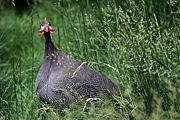Guineafowl
| Guineafowl | ||||||||||
|---|---|---|---|---|---|---|---|---|---|---|
 Helmeted Guineafowl, Numida meleagris
|
||||||||||
| Scientific classification | ||||||||||
|
||||||||||
| Genera | ||||||||||
|
The guineafowl (sometimes called guineahen) are a family of birds in the same order as the pheasants, turkeys and other game birds and is native to Africa.
Contents |
Description and ecology
This is a family of insect and seed-eating, ground-nesting birds resembling partridges, but with featherless heads and spangled grey plumage. At least three of the species are poorly studied.

The species for which the information is known are normally monogamous, mating for life. However, occasional bigamy has been recorded for the Helmeted Guineafowl (Madge and McGowan, p345-352).
They are large birds which measure from 40-71 cm in length, and weigh 700-1600 g.
The Helmeted Guineafowl has been domesticated and introduced outside its natural range, for example in southern France, the West Indies, and esp. the United States.
The American Ornithologists' Union includes guineafowl (Numididae) as a subfamily of Phasianidae.

List of species in taxonomic order
This is a list of guineafowl species, presented in taxonomic order.
- Genus Agelastes
- White-breasted Guineafowl, Agelastes meleagrides
- Black Guineafowl, Agelastes niger
- Genus Numida
- Helmeted Guineafowl, Numida meleagris
- Genus Guttera
- Plumed Guineafowl, Guttera plumifera
- Crested Guineafowl, Guttera pucherani
- Genus Acryillium
- Vulturine Guineafowl, Acryllium vulturinum
Domesticated guineafowl
Guineafowl have a long history of domestication, mainly involving the Helmeted Guineafowl. The young, called "keets" are very small at birth. The keets are kept in a brooder box inside the house until about 6 weeks of age, before being moved into a proper coop/enclosure. They eat lice, worms, ants, spiders, weedseeds, and ticks while on range or they can also eat chicken layer crumbles (one kind of commercial bird food) while housed in a coop.
References
- Madge and McGowan,Pheasants, Partridges and Grouse ISBN 0-7136-3966-0
- Martínez, I. (1994). Family Numididae (Guineafowl). Pp.554-570 in; del Hoyo, J., Elliott, A. & Sargatal, J. eds. Handbook of the Birds of the World, Vol. 2. New World Vultures to Guineafowl. Lynx Edicions, Barcelona. ISBN 8487334156
External links
- Guineafowl videos on the Internet Bird Collection